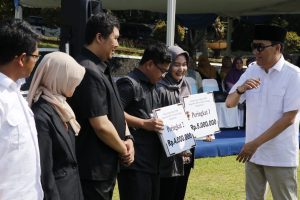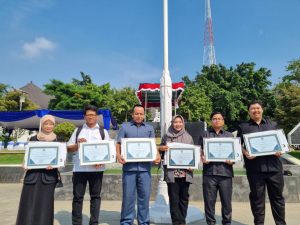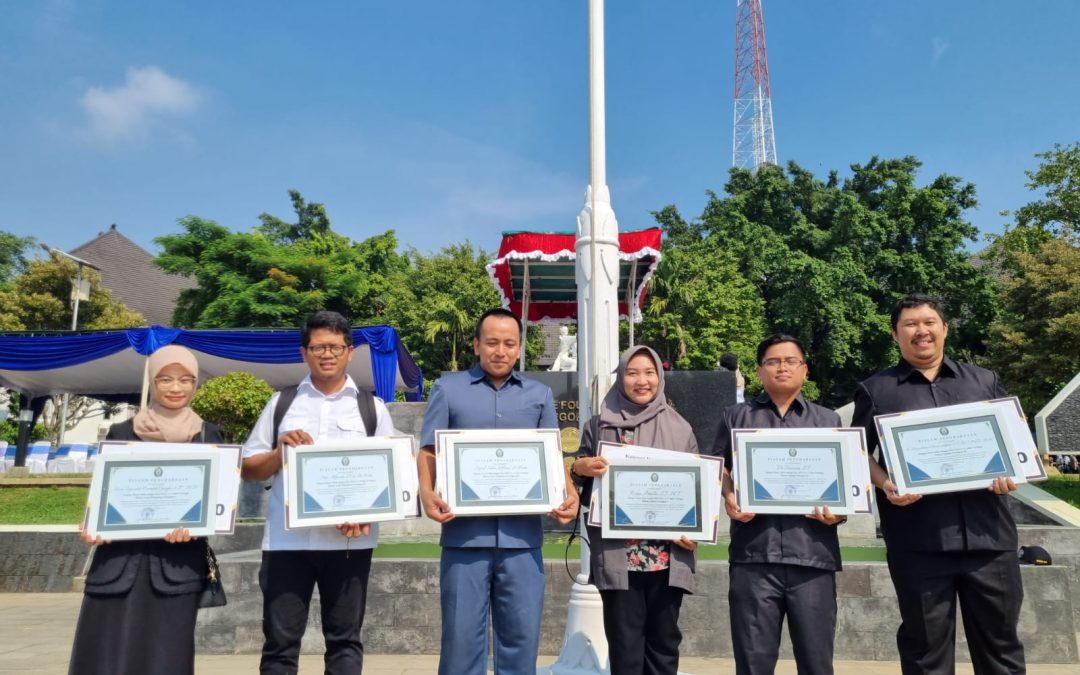Diponegoro University Vocational Lecturer Rizka Amalia, S.T., M.T. recently received an award as SINTA 2023 Affiliated Young Lecturer in the field of science and technology, Rank 1. The award was given by the Chancellor of Diponegoro University, Prof. Dr. Yos Johan Utama, SH MHum at the Award Ceremony which took place during the Mother’s Day commemoration ceremony at Widya Puraya Field, Undip Tembalang. “SINTA (Science and Technology Index) is a database that measures the performance of science and technology, and is a medium for showing the performance of an educational institution or university,” he said. It should be noted that each lecturer’s report card score is reflected in the Sinta Score, because it represents the lecturer’s performance such as research, community service, teaching (books), scientific publications and intellectual property.

Rizka, who is one of the lecturers in the Undip Vocational Industrial Chemical Engineering Technology Study Program (TRKI), is very fond of improving competence both through industrial competency certification and retooling in various countries. Retooling or retraining which is carried out almost every year includes: National Institute of Advanced Industrial Science and Technology (AIST) Japan, Van Hall Larenstein University of Applied Science, Leeuwarden–Netherland, and University of Rhode Island–USA. No half-hearted, this has been the SINTA award for 2 years in a row, because it is supported by various productive activities in terms of research. His current research has the theme “Refining Palm Oil for Reducing 3-MCPD Compounds through Bioadsorption with Modified Palm Oil Empty Bunches”. Rizka said that this research was motivated by her concern about palm oil which is consumed as a healthy food oil (cooking oil), which is suspected to contain the compound 3-monochloro-propane-1,2-diol (3-MCPD) ester in the range of 0.04 – 0. 05 ppm. The 3-MCPD ester compound is a contaminant that is included in the chloropropanol group which is a genotoxin carcinogen. The specification for the content of 3-MCPD ester in palm oil is still a matter of controversy, but several European Union countries have used it as a barrier to palm oil trade in the European region. For this reason, Rizka and the Prof. Research Team. Dr. Eflita Yohana, MT, Dr. Indah Hartati, ST, MT, Mohamad Endy Yulianto, ST, MT developed palm oil refining through fixed bed adsorption with modified empty palm fruit bunch bioadsorbent to reduce 3-MCPD esters (< 0.02 ppm/Codex Standard) to obtain well-proven technology. Refining palm oil through fixed bed adsorption with bioadsorbent from empty palm fruit bunches has great potential for development. This fixed bed adsorption column has various advantages including: easy operation, cheap equipment fabrication, minimal friction between adsorbents, no loss of adsorbent, maximum adsorbent capacity, and the adsorbent in the fixed bed will act like layers where each layer will be in contact with the adsorbed solution, said Rizka. The 3-MCPD ester compound is believed to be a compound formed from the reaction between chloride ions and free glycerol found in food products as a result of fat hydrolysis. Therefore, the reduction of 3-MCPD esters in palm oil products can be carried out in two ways, namely by avoiding encounters between the precursors for the formation of 3-MCPD esters (glycerol and chloride ions), or by removing the 3-MCPD esters that have been formed by physical, chemical and microbiological methods, explained Rizka. Rizka added that obtaining palm oil that is free from the 3-MCPD compound is believed to increase the competitiveness and added value of Indonesian palm oil. The resulting technology is a solution to the issue of the formation of 3-MCPD ester compounds in palm oil which has become a barrier in international trade. This research will also have a big impact on the growth of the Indonesian palm oil industry.

Meanwhile, the Dean of the Undip Vocational School, Prof. Dr. Ir. Budiyono, M.Sc. admitted that he was grateful for the achievements achieved by Undip Vocational School lecturers and added to the list of achievements of Undip Vocational School lecturers. This achievement is proof of how the performance of the Vocational School academic community is recognized by the university. “So, we hope that the lecturers at the Undip Vocational School can be motivated, continue to improve their competence, and no less importantly maintain enthusiasm in improving Sinta Score performance achievements,” he concluded.


Recent Comments